初中英语语法知识—疑问句的分类汇编(1)
初中英语知识点归纳疑问句的分类和用法

初中英语知识点归纳疑问句的分类和用法在初中英语学习中,疑问句是非常重要和常用的语法结构之一。
掌握各种疑问句的分类和用法,可以帮助我们更准确地提问和理解他人的问题。
本文将就初中英语知识点归纳疑问句的分类和用法展开论述。
一、一般疑问句一般疑问句是用来征询基本事实的疑问句,其基本句型结构为:助动词(或be动词)+主语+谓语(其余成分)。
疑问句通常以问句形式结尾,例如:"Do you like swimming?"(你喜欢游泳吗?), "Is she a doctor?"(她是医生吗?)。
二、特殊疑问句特殊疑问句用于征询对特定信息或事实的询问,常用的特殊疑问句包括:疑问词(who, what, when, where, why, how等)+一般疑问句句型。
以下是常见的特殊疑问句的用法:1. What:用于询问事物、活动或情况。
- What's your favorite color?(你最喜欢的颜色是什么?)- What do you want to be in the future?(你将来想成为什么?)2. Where:用于询问地点或位置。
- Where is the nearest bus stop?(最近的公交车站在哪里?)- Where did you go for your last vacation?(你上次去了哪里度假?)3. When:用于询问时间或日期。
- When is your birthday?(你的生日是什么时候?)- When did you start learning English?(你何时开始学英语?)4. Who:用于询问人物身份或者做某事的人。
- Who is your best friend?(你最好的朋友是谁?)- Who wrote the book "Pride and Prejudice"?(谁写的《傲慢与偏见》?)5. Why:用于询问原因或理由。
初中英语知识点归纳疑问句的构成与回答方式
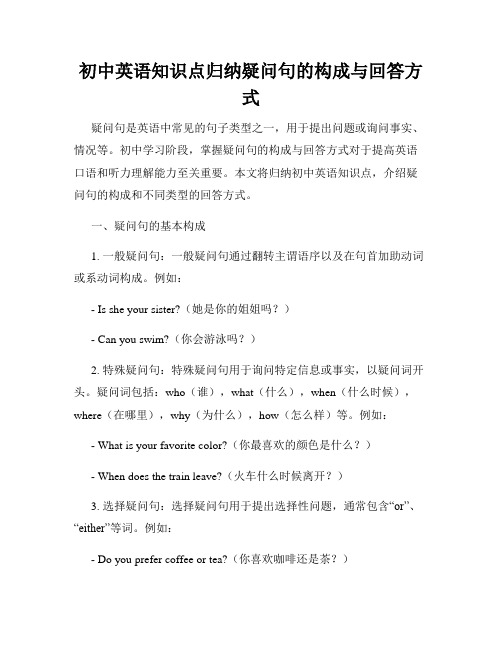
初中英语知识点归纳疑问句的构成与回答方式疑问句是英语中常见的句子类型之一,用于提出问题或询问事实、情况等。
初中学习阶段,掌握疑问句的构成与回答方式对于提高英语口语和听力理解能力至关重要。
本文将归纳初中英语知识点,介绍疑问句的构成和不同类型的回答方式。
一、疑问句的基本构成1. 一般疑问句:一般疑问句通过翻转主谓语序以及在句首加助动词或系动词构成。
例如:- Is she your sister?(她是你的姐姐吗?)- Can you swim?(你会游泳吗?)2. 特殊疑问句:特殊疑问句用于询问特定信息或事实,以疑问词开头。
疑问词包括:who(谁),what(什么),when(什么时候),where(在哪里),why(为什么),how(怎么样)等。
例如:- What is your favorite color?(你最喜欢的颜色是什么?)- When does the train leave?(火车什么时候离开?)3. 选择疑问句:选择疑问句用于提出选择性问题,通常包含“or”、“either”等词。
例如:- Do you prefer coffee or tea?(你喜欢咖啡还是茶?)- Would you like to go to the movies or stay at home?(你想去电影院还是待在家里?)4. 简答疑问句:简答疑问句是对陈述句进行提问,期望得到“是”或“不是”这样的简单回答。
例如:- You are a teacher, aren't you?(你是一名老师,对吗?)- She can swim, can't she?(她会游泳,对吧?)二、疑问句的回答方式1. 一般疑问句的回答方式:- 是的,肯定回答:Yes, + 主语 + 动词原形。
例如:Yes, he is.- 不,否定回答:No, + 主语 + 助动词(或系动词的否定形式)。
例如:No, he isn't.2. 特殊疑问句的回答方式:- 对事物进行提问,回答通常为具体信息。
(专题精选)初中英语语法知识—疑问句的分类汇编附解析

一、选择题1.---Eric, _____ can you have your poster been ready?---I'm not sure. We are still waiting for the final design.A.how long B.how soon C.how often D.how far2.— do your parents go to the movies?— Twice a month.A.How soon B.How far C.How often D.How long 3.Since the road is muddy,it ________last night, ________?A.must be rained; wasn’t it B.must have rained; didn’t itC.must rained; didn’t it D.must have rained; wasn’t it4.—________ do you play computer games, Lily?—I only play on Friday night.A.How B.Where C.Why D.When5.—This is your dictionary. And _______________the eraser?—It isn't mine. It's Bob's.A.what about B.how C.who D.what6.—________ hours do you exercise every day? —Two.A.How long B.How often C.How much D.How many 7.—________— It is orange.A.What is this? B.What color is it? C.What are these? D.What color are they? 8.—Is the girl your friend? —________. Her name's Gina.A.No, it isn't. B.Yes, she is. C.Yes, it is.9.—He’s never stolen anything before,______ he?—______. It’s his third time to be taken to the police station.A.hasn’t:Yes B.is;Yes C.has;Yes D.has;No 10.— Why ______ you like the cat?—Because she’s kind of ______.A.do; boring B.don’t; interesting C.do; interested D.don’t; boring 11.—Could I smoke here?—____. Look at the sign” No smoking!”A.Yes, you may. B.Of course you can.C.No, you can’t.D.No, you couldn’t.12.—_____ the population of the U.S.A.in 2005? —It _____ about 296 million.A.What is; is B.What was; was C.How many is; was D.How many was; is 13.—Is the young woman playing the violin?—________.A.Yes,she is B.No,she doesn'tC.Yes,she does D.No,he isn't14.— __________.— He is not very handsome, but he is humorous.A.What does he look? B.What is he like?C.How does he look? D.How does he look like?15.—The surgeon hasn’t come back, has he?—_______, for he _______ Australia since last week and will be back in a week.A.No; has been in B.No; has gone to C.Yes; has gone to D.Yes; has been in 16.What ______ your dream home ______?A.does; look B.does; likeC.is; like D.is; look like17.—How is everything going at school ,dear ?—________.A.All right, thanks. B.Not too bad, I guessC.That’s right.D.I’m glad to hear that.18.—I’m going to visit my grandparents tomorrow.—________ telephone them in advance?A.Why not you B.You would better C.Why don’t D.Why don’t you 19.—This is my pen. _______ this book?—It’s Bob’s. Look, his name is on it.A.What’s B.Who’s C.What about20.— Excuse me, ________ is it from here to Zhongshan Park?—It's about thirty minutes’ walk.A.how long B.how often C.how far D.how much 21.- ______ do you go to visit your grandparents?- Once a week.A.How far B.How much C.How often D.How long 22.—________do you visit your grandparents, Linda? —Once a month.A.How long B.How much C.How often23.The poor man needs our help, he?A.need B.needn't C.does D.doesn't 24.—Is Billy rat or thin?—________.A.Yes, he is B.No, he isn't C.He's a new boy D.He's fat 25.— do you go to work every day?—By bike.A.What B.Who C.How D.When【参考答案】***试卷处理标记,请不要删除一、选择题1.B解析:B【解析】【详解】句意“-艾瑞克,你多久能把海报准备好?-我不确定,我们仍然在等待最后的设计”。
英语疑问句的分类
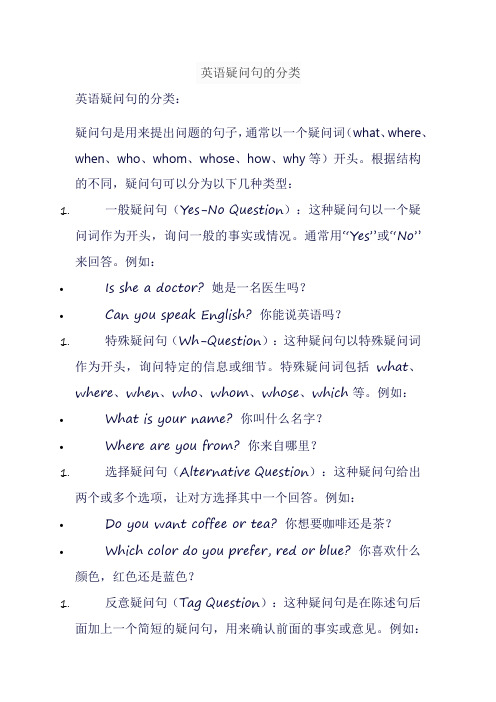
英语疑问句的分类英语疑问句的分类:疑问句是用来提出问题的句子,通常以一个疑问词(what、where、when、who、whom、whose、how、why等)开头。
根据结构的不同,疑问句可以分为以下几种类型:1.一般疑问句(Yes-No Question):这种疑问句以一个疑问词作为开头,询问一般的事实或情况。
通常用“Yes”或“No”来回答。
例如:•Is she a doctor? 她是一名医生吗?•Can you speak English? 你能说英语吗?1.特殊疑问句(Wh-Question):这种疑问句以特殊疑问词作为开头,询问特定的信息或细节。
特殊疑问词包括what、where、when、who、whom、whose、which等。
例如:•What is your name? 你叫什么名字?•Where are you from? 你来自哪里?1.选择疑问句(Alternative Question):这种疑问句给出两个或多个选项,让对方选择其中一个回答。
例如:•Do you want coffee or tea? 你想要咖啡还是茶?•Which color do you prefer, red or blue? 你喜欢什么颜色,红色还是蓝色?1.反意疑问句(Tag Question):这种疑问句是在陈述句后面加上一个简短的疑问句,用来确认前面的事实或意见。
例如:•He likes English, doesn't he? 他喜欢英语,不是吗?•They will come to the party, won't they? 他们将会来参加聚会,不是吗?以上是英语疑问句的基本分类。
不同类型的疑问句有不同的结构和用法,在日常交流和写作中需要根据具体情况选择使用。
初中英语疑问句知识点
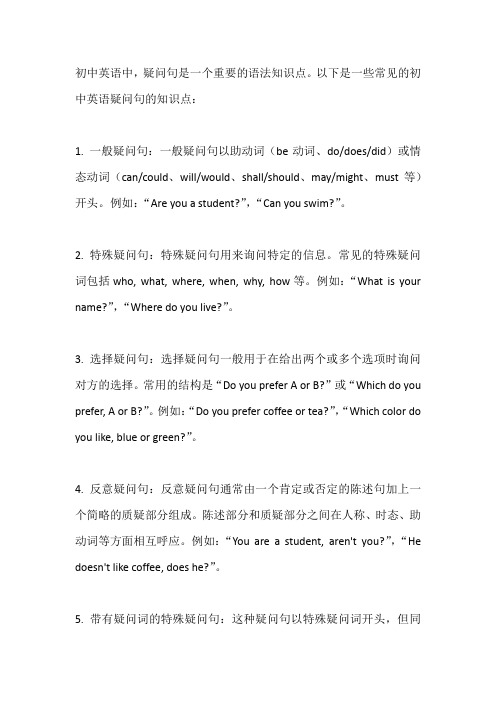
初中英语中,疑问句是一个重要的语法知识点。
以下是一些常见的初中英语疑问句的知识点:1. 一般疑问句:一般疑问句以助动词(be动词、do/does/did)或情态动词(can/could、will/would、shall/should、may/might、must等)开头。
例如:“Are you a student?”,“Can you swim?”。
2. 特殊疑问句:特殊疑问句用来询问特定的信息。
常见的特殊疑问词包括who, what, where, when, why, how等。
例如:“What is your name?”,“Where do you live?”。
3. 选择疑问句:选择疑问句一般用于在给出两个或多个选项时询问对方的选择。
常用的结构是“Do you prefer A or B?”或“Which do you prefer, A or B?”。
例如:“Do you prefer coffee or tea?”,“Which color do you like, blue or green?”。
4. 反意疑问句:反意疑问句通常由一个肯定或否定的陈述句加上一个简略的质疑部分组成。
陈述部分和质疑部分之间在人称、时态、助动词等方面相互呼应。
例如:“You are a student, aren't you?”,“He doesn't like coffee, does he?”。
5. 带有疑问词的特殊疑问句:这种疑问句以特殊疑问词开头,但同时也包含了一般疑问句的结构。
例如:“What time do you usually get up?”,“How often do you exercise?”。
学生在学习疑问句时需要注意以下几点:-疑问句的变换方式,如将陈述句转换为一般疑问句、特殊疑问句等;-特殊疑问词的使用及其不同的含义和用法;-语序的变化,特别是特殊疑问句中主语和谓语的位置变化。
初中英语语法知识—疑问句的分类汇编及解析(1)
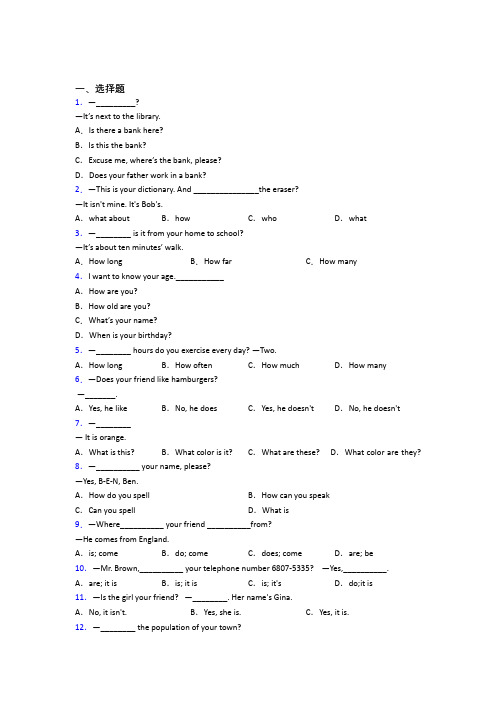
一、选择题1.—_________?—It’s next to the library.A.Is there a bank here?B.Is this the bank?C.Excuse me, where’s the bank, please?D.Does your father work in a bank?2.—This is your dictionary. And _______________the eraser?—It isn't mine. It's Bob's.A.what about B.how C.who D.what3.—________ is it from your home to school?—It’s about ten minutes’ walk.A.How long B.How far C.How many4.I want to know your age.___________A.How are you?B.How old are you?C.What’s your name?D.When is your birthday?5.—________ hours do you exercise every day? —Two.A.How long B.How often C.How much D.How many 6.—Does your friend like hamburgers?—_______.A.Yes, he like B.No, he does C.Yes, he doesn't D.No, he doesn't 7.—________— It is orange.A.What is this? B.What color is it? C.What are these? D.What color are they? 8.—__________ your name, please?—Yes, B-E-N, Ben.A.How do you spell B.How can you speakC.Can you spell D.What is9.—Where__________ your friend __________from?—He comes from England.A.is; come B.do; come C.does; come D.are; be 10.—Mr. Brown,__________ your telephone number 6807-5335? —Yes,__________. A.are; it is B.is; it is C.is; it's D.do;it is11.—Is the girl your friend? —________. Her name's Gina.A.No, it isn't. B.Yes, she is. C.Yes, it is.12.—________ the population of your town?—About thirty thousand.A.What are B.How much is C.How many are D.What’s 13.— Why ______ you like the cat?—Because she’s kind of ______.A.do; boring B.don’t; interesting C.do; interested D.don’t; boring 14.—Hello!Are you Helen?—.My name’s Tina.A.Yes,I am B.Yes,it is C.No,I’m not15.---Eric, _____ can you have your poster been ready?---I'm not sure. We are still waiting for the final design.A.how long B.how soon C.how often D.how far 16.—I’m going to visit my grandparents tomorrow.—________ telephone them in advance?A.Why not you B.You would better C.Why don’t D.Why don’t you 17.—____ is it from here?—It’s about five minutes’ walk.A.How long B.How soon C.How often D.How far18.The poor man needs our help, he?A.need B.needn't C.does D.doesn't 19.—Excuse me, ________? —Yes. Go along this street and turn right.A.how can I get to the bookstore B.which is the way to the bookstore C.is there a bookstore near here D.where is the bookstore20.—__________ will the project of Wuxi Metro Line 3 be completed?—It won’t take long. Just in about 3 months.A.How long B.How far C.How soon D.How often 21.Peter has never seen such a big fish in his life, ________?A.has he B.hasn’t he C.does he D.doesn't he 22.-- ______--No,it’s in the bookcase.A.Where is his dictionary? B.Where are his books?C.Is his book on the desk? D.Is his pencil in the bookcase?23.________your brother________ a baseball?A.Do; have B.Does; has C.Does; have D.Do; has 24.— I want to make some drink with honey. _______ spoons of honey do we need?— I think we need 3.A.How about B.How much C.How many 25.—He’s never stolen anything before,______ he?—______. It’s his third time to be taken to the police station.A.hasn’t:Yes B.is;Yes C.has;Yes D.has;No【参考答案】***试卷处理标记,请不要删除一、选择题1.C解析:C【解析】【分析】【详解】试题分析:句意:——对不起,打扰你了,请问银行在哪里?——它紧挨着图书馆。
初中英语知识点归纳常见的疑问词和疑问句型
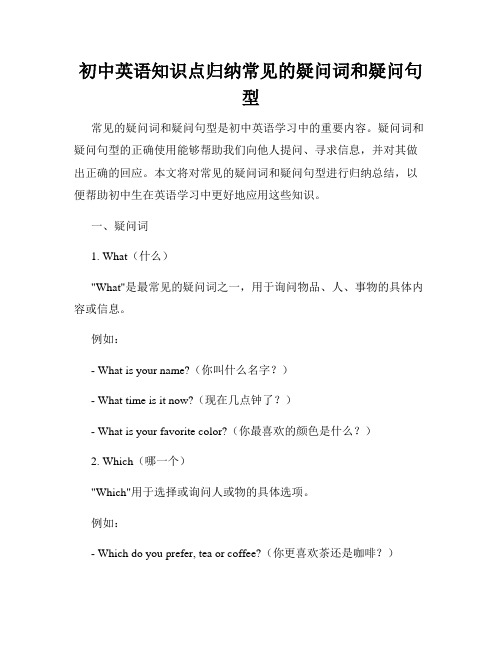
初中英语知识点归纳常见的疑问词和疑问句型常见的疑问词和疑问句型是初中英语学习中的重要内容。
疑问词和疑问句型的正确使用能够帮助我们向他人提问、寻求信息,并对其做出正确的回应。
本文将对常见的疑问词和疑问句型进行归纳总结,以便帮助初中生在英语学习中更好地应用这些知识。
一、疑问词1. What(什么)"What"是最常见的疑问词之一,用于询问物品、人、事物的具体内容或信息。
例如:- What is your name?(你叫什么名字?)- What time is it now?(现在几点钟了?)- What is your favorite color?(你最喜欢的颜色是什么?)2. Which(哪一个)"Which"用于选择或询问人或物的具体选项。
例如:- Which do you prefer, tea or coffee?(你更喜欢茶还是咖啡?)- Which book do you want to borrow?(你想借哪本书?)- Which team won the match?(哪个队赢得了比赛?)3. Who(谁)"Who"用于询问人的身份或者对特定人的具体了解。
例如:- Who is your best friend?(你最好的朋友是谁?)- Who won the competition?(谁赢得了比赛?)- Who is the president of the country?(国家的总统是谁?)4. Whose(谁的)"Whose"用于询问所有权。
例如:- Whose book is this?(这本书是谁的?)- Whose pen did you borrow?(你借了谁的钢笔?)- Whose turn is it to clean the classroom?(该轮到谁来打扫教室了?)5. When(什么时候)"When"用于询问时间、日期或事件发生的具体时间。
初中英语疑问句用法大全,中考必看,建议收藏
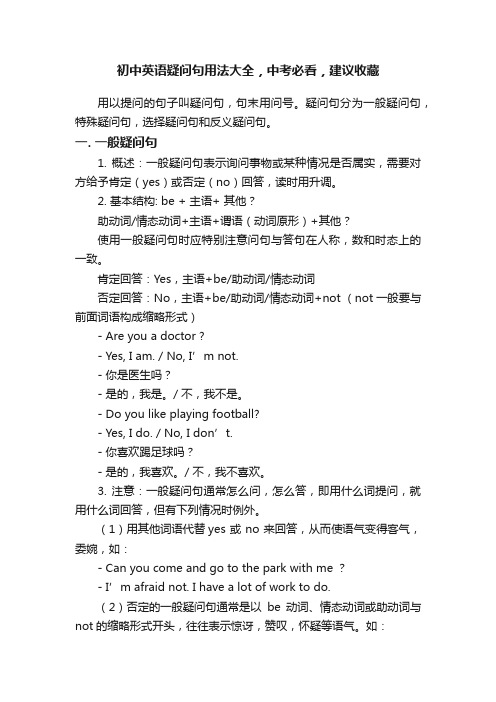
初中英语疑问句用法大全,中考必看,建议收藏用以提问的句子叫疑问句,句末用问号。
疑问句分为一般疑问句,特殊疑问句,选择疑问句和反义疑问句。
一. 一般疑问句1. 概述:一般疑问句表示询问事物或某种情况是否属实,需要对方给予肯定(yes)或否定(no)回答,读时用升调。
2. 基本结构: be + 主语+ 其他?助动词/情态动词+主语+谓语(动词原形)+其他?使用一般疑问句时应特别注意问句与答句在人称,数和时态上的一致。
肯定回答:Yes,主语+be/助动词/情态动词否定回答:No,主语+be/助动词/情态动词+not (not 一般要与前面词语构成缩略形式)- Are you a doctor ?- Yes, I am. / No, I’m not.- 你是医生吗?- 是的,我是。
/ 不,我不是。
- Do you like playing football?- Yes, I do. / No, I don’t.- 你喜欢踢足球吗?- 是的,我喜欢。
/ 不,我不喜欢。
3. 注意:一般疑问句通常怎么问,怎么答,即用什么词提问,就用什么词回答,但有下列情况时例外。
(1)用其他词语代替yes 或 no 来回答,从而使语气变得客气,委婉,如:- Can you come and go to the park with me ?- I’m afraid not. I have a lot of work to do.(2)否定的一般疑问句通常是以be动词、情态动词或助动词与not的缩略形式开头,往往表示惊讶,赞叹,怀疑等语气。
如:- Don’t you hear of that ?- Yes, I do./ No, I don’t.-(表惊讶)你没听说过那件事吗?- 不,我听过。
/ 是的,我没听过。
二. 特殊疑问句1. 概述:就句中某一部分进行提问的疑问句叫特殊疑问句。
句末读降调。
2. 结构:特殊疑问词+一般疑问句3. 特殊疑问词(1)疑问代词:可以对主语,表语,宾语,定语提问,如,what(什么),who(谁),whom(宾格,谁)which(哪一个),whose(谁的)等。
初中英语句子种类之疑问句
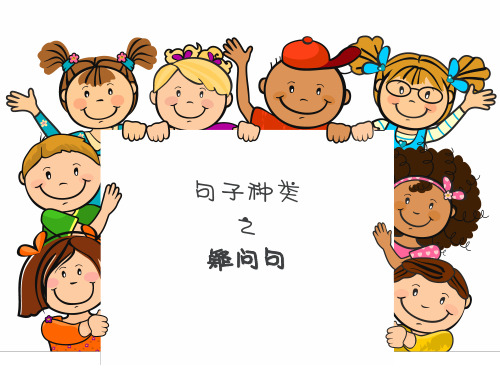
let's是let us的缩写。包括说话人和听话人双方在内,含 有催促、建议或请对方一起行动的意思。当请求对方允许自己 (第一人称复数)做某事时,要用let us,这里的us不包括听话人 在内,不能缩写为let's。
19
反意疑问句
3、特殊句式
⑻当陈述句的主语为 each of... 结构时,表示 “个别的,各个”之意时,其附加疑问句的主语用he; 表示“全体”时,则附加疑问句的主语可以用 they, we, you.
⑼动词不定式或动名词作主语时,附加疑问句的 主语用it. ⑽当陈述句带有no,never,nothing,nobody, no one,nowhere,few,little,seldom,hardly等 表示否定意义的词时,附加疑问句用肯定形式。
⑿ how often意为“多久一次”,用于询问频率。
9
特殊疑问句
常见疑问词的用法
⒀ how soon 意为“多久”,用来询问将来的一 段时间。
⒁ how long(wide, tall/high, deep, far) 用于询问长、宽、高、深、远等。
10
特殊疑问句
高频考点:
1、特殊疑问句 What about/How about+名词/代 词/动名词+...?意为“……怎么样?”用于表示建议、 邀请或征求对方意见等。
——吉姆不是来自英国,是吗?
-- Jim isn't from England, is he? ——是的,他不是来自英国。
-- No, he isn't.
初中英语知识点归纳疑问句和反意疑问句的用法
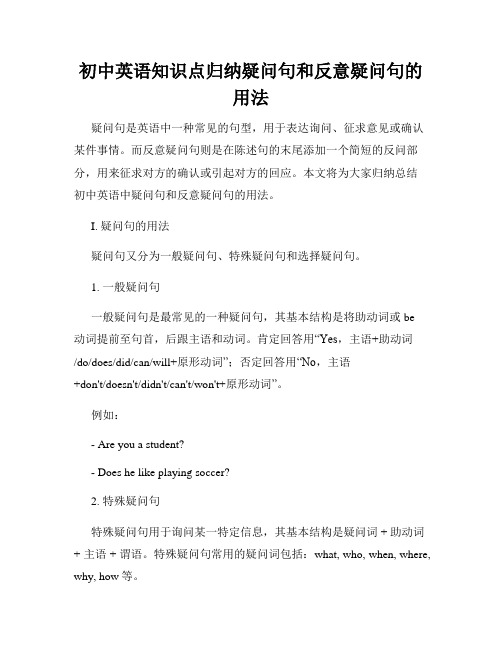
初中英语知识点归纳疑问句和反意疑问句的用法疑问句是英语中一种常见的句型,用于表达询问、征求意见或确认某件事情。
而反意疑问句则是在陈述句的末尾添加一个简短的反问部分,用来征求对方的确认或引起对方的回应。
本文将为大家归纳总结初中英语中疑问句和反意疑问句的用法。
I. 疑问句的用法疑问句又分为一般疑问句、特殊疑问句和选择疑问句。
1. 一般疑问句一般疑问句是最常见的一种疑问句,其基本结构是将助动词或be动词提前至句首,后跟主语和动词。
肯定回答用“Yes,主语+助动词/do/does/did/can/will+原形动词”;否定回答用“No,主语+don't/doesn't/didn't/can't/won't+原形动词”。
例如:- Are you a student?- Does he like playing soccer?2. 特殊疑问句特殊疑问句用于询问某一特定信息,其基本结构是疑问词 + 助动词+ 主语 + 谓语。
特殊疑问句常用的疑问词包括:what, who, when, where, why, how等。
例如:- What is your name?- Where do you live?3. 选择疑问句选择疑问句用于提供选择的问题,其基本结构是“Or”连接两个陈述句。
其中,前一陈述句用正语序,后一陈述句用部分倒装语序。
回答选择疑问句时,可以根据实际情况选择其中一个选项进行回答。
例如:- Would you like tea or coffee?- Do you prefer basketball or football?II. 反意疑问句的用法反意疑问句用于在陈述句的末尾添加反问部分,并且正反之间一般存在意义上的对立或前后关系。
基本结构为:陈述句,正反疑问句。
1. 使用助动词当陈述句中有助动词时,反意疑问句一般使用助动词的缩略形式。
例如:- You can swim, can't you?- He likes playing tennis, doesn't he?2. 使用be动词当陈述句中是be动词时,反意疑问句中使用do作为辅助动词。
疑问句知识点总结

疑问句知识点总结疑问句是一种用来提出问题或询问信息的句子,通常以疑问代词或疑问词开头。
疑问句在日常交流中应用广泛,能够帮助人们获取所需的信息,表达好奇、疑惑或不确定的情绪。
疑问句的构成方式多样,包括倒装句、特殊疑问句和一般疑问句等。
下面将从这几个方面对疑问句的知识点进行总结。
一、倒装句倒装句是指将谓语动词或其它成分提前,主语放在谓语动词之后的句子结构。
在疑问句中,倒装句常常用于强调或转折的语境中。
常见的情况包括以下几种:1. 以“here, there, in, out, up, down”等副词开头的句子。
例如:Here comes the bus.(车来了。
)There goes the bell.(铃响了。
)2. 以表示方向的短语或副词开头的句子。
例如:Out rushed the children.(孩子们冲了出来。
)Up jumped the cat.(猫跳了起来。
)3. 表示状态、感叹或疑问的句子。
例如:Never had I seen such a beautiful sunset.(我从未见过如此美丽的日落。
)So dark is the night.(夜色如此黑)。
4. 否定词位于句首的句子。
例如:Not until last year did I realize the importance of health.(直到去年我才意识到健康的重要性。
)5. 以连词或副词短语引导的句子。
例如:Little did she know that she was being watched.(她小小的时候并不知道她正在被监视。
)Seldom does he go to the cinema.(他很少去电影院。
)倒装句的运用需要根据具体语境进行判断,同时也需要注意谓语动词的形式和语序的变化。
二、特殊疑问句特殊疑问句是以特殊疑问词开头的问句,用以询问特定信息。
特殊疑问词包括what, where, when, why, who, how等。
疑问句大全—— 一般疑问句、特殊疑问句、选择疑问句、反意疑问句
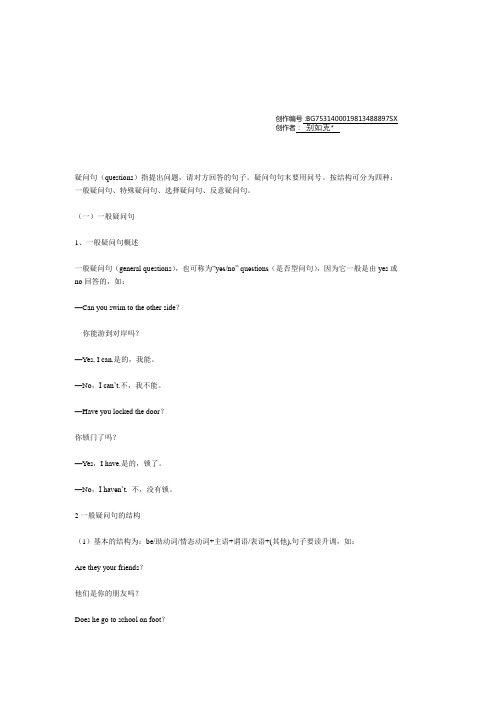
创作编号:BG7531400019813488897SX创作者:别如克*疑问句(questions)指提出问题,请对方回答的句子。
疑问句句末要用问号。
按结构可分为四种:一般疑问句、特殊疑问句、选择疑问句、反意疑问句。
(一)一般疑问句1、一般疑问句概述一般疑问句(general questions),也可称为“yes/no” questions(是否型问句),因为它一般是由yes或no回答的,如:—Can you swim to the other side?你能游到对岸吗?—Yes, I can.是的,我能。
—No,I can’t.不,我不能。
—Have you locked the door?你锁门了吗?—Yes,I have.是的,锁了。
—No,I haven’t. 不,没有锁。
2一般疑问句的结构(1)基本的结构为:be/助动词/情态动词+主语+谓语/表语+(其他),句子要读升调,如:Are they your friends?他们是你的朋友吗?Does he go to school on foot?他是步行去上学吗?Will you be free tonight?你今晚有空吗?Can you play basketball?你会打篮球吗?(2)陈述句亦可用作一般疑问句,多用在非正式文体中,句末有问号,用升调,如:Somebody is with you?有人和你一起吗?He didn’t finish the work?他没有做完活吗?You are fresh from America,I suppose?我猜,你刚从美国回来吧?3、一般疑问句的答语(1)一般疑问句一般由yes或no来回答,如:—Are you tired?你累了吗?—Yes,I am.是的,累了。
—No, I’m not.不,不累。
—Does she do the cleaning?她扫除了吗?—Yes ,she does.是的,她打扫了。
初中英语语法知识—疑问句的分类汇编附解析(1)

解析:B
【解析】
【分析】
【详解】
句意:——你为什么喜欢星期天?——因为我不需要去上学。
考查疑问词,A. When何时;B. Why为什么;C. Where哪里。根据回答“Because I don’t need to go to school.”,可知应该是问原因,故选B。
11.C
解析:C
【解析】
9.—Your sister isn’t a nurse, is she?
—________. She teaches Chinese in a primary school.
A.No, she isn’tB.Yes, she isC.Yes, she isn’tD.No, she is
10.— _______ do you like Sunday?
23.We have to swipe our student card (刷学生卡) when we get to or leave school every day, ________ we?
A.doB.don’tC.haveD.haven’t
24.—Hello!Are you Helen?
—.My name’s Tina.
【点睛】
注意区分:must be一定是;can’t be不可能是;must have done sth一定做过某事(对已发生事情的推测)。
3.A
解析:A
【解析】
【分析】
【详解】
句意:——这是你的词典。那个橡皮呢?——它不是我的。它是鲍勃的。
本题考查特殊疑问句。what about怎么样?how如何,who谁,what什么。根据It isn't mine. It's Bob's.可知,此处询问橡皮的情况。故选A。
英语疑问句类型

英语疑问句类型英语疑问句通常用于提问,以获取信息或确认某事。
以下是常见的英语疑问句类型:1. 一般疑问句(Yes/No Questions):这是最常见的疑问句类型,用来询问是否是肯定或否定的情况。
一般疑问句以助动词、系动词或情态动词开头,例如:“Are you coming?”(你来吗?),“Can she swim?”(她会游泳吗?)。
2. 特殊疑问句(Wh-Questions):这种疑问句类型用于询问特定信息,通常以疑问词(如what, where, when, why, how, who, which)开头,例如:“What is your name?”(你叫什么名字?),“Where are you going?”(你要去哪里?)。
3. 选择疑问句(Choice Questions):这类疑问句给对方提供了两个或更多的选项,以便他们选择其中一个来回答。
例如:“Do you want tea or coffee?”(你想要茶还是咖啡?)。
4. 反义疑问句(Tag Questions):这种疑问句附加在陈述句后面,用来确认或加强前面的陈述。
通常以肯定句陈述,然后以否定疑问词结尾,或以否定句陈述,然后以肯定疑问词结尾。
例如:“You like pizza, don't you?”(你喜欢披萨,是吗?),“She doesn't speak Spanish, does she?”(她不会说西班牙语,对吗?)。
5. 反问句(Echo Questions):这种疑问句是为了寻求对方的确认或重复之前的话语。
通常以与之前的陈述完全相同的方式重复前面的话语,例如:“It's a beautiful day, isn't it?”(今天天气真好,不是吗?)。
6. 以动词开头的疑问句(Verb-Starting Questions):这种疑问句以动词开头,通常用于正式场合,以获取信息或确认某事。
疑问句语法大全
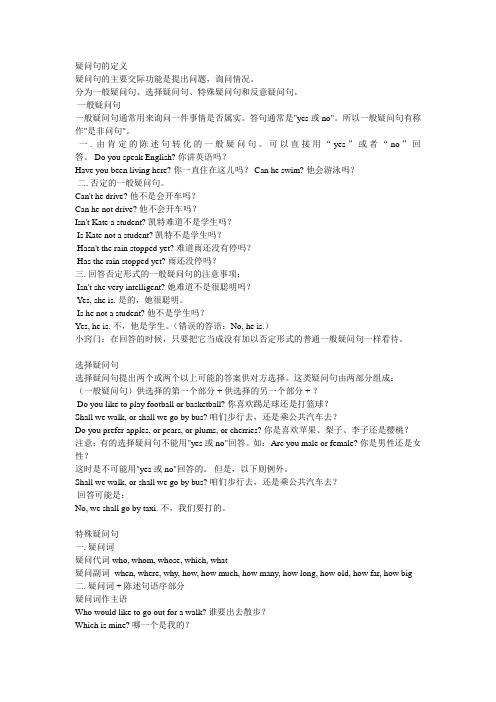
疑问句的定义疑问句的主要交际功能是提出问题,询问情况。
分为一般疑问句、选择疑问句、特殊疑问句和反意疑问句。
一般疑问句一般疑问句通常用来询问一件事情是否属实。
答句通常是"yes或no"。
所以一般疑问句有称作"是非问句"。
一. 由肯定的陈述句转化的一般疑问句。
可以直接用“yes”或者“no”回答。
Do you speak English? 你讲英语吗?Have you been living here? 你一直住在这儿吗? Can he swim? 他会游泳吗?二. 否定的一般疑问句。
Can't he drive? 他不是会开车吗?Can he not drive? 他不会开车吗?Isn't Kate a student? 凯特难道不是学生吗?Is Kate not a student? 凯特不是学生吗?Hasn't the rain stopped yet? 难道雨还没有停吗?Has the rain stopped yet? 雨还没停吗?三. 回答否定形式的一般疑问句的注意事项:Isn't she very intelligent? 她难道不是很聪明吗?Yes, she is. 是的,她很聪明。
Is he not a student? 他不是学生吗?Yes, he is. 不,他是学生。
(错误的答语:No, he is.)小窍门:在回答的时候,只要把它当成没有加以否定形式的普通一般疑问句一样看待。
选择疑问句选择疑问句提出两个或两个以上可能的答案供对方选择。
这类疑问句由两部分组成:(一般疑问句)供选择的第一个部分 + 供选择的另一个部分 + ?Do you like to play football or basketball? 你喜欢踢足球还是打篮球?Shall we walk, or shall we go by bus? 咱们步行去,还是乘公共汽车去?Do you prefer apples, or pears, or plums, or cherries? 你是喜欢苹果、梨子、李子还是樱桃?注意:有的选择疑问句不能用"yes或no"回答。
疑问句知识点详解(初中英语专项复习)1

疑问句知识点详解(初中英语专项复习)【概念】以上两句是由特殊疑问副词why引导的特殊疑问句及其because引导的答语。
下面就特殊疑问句的相关知识梳理如下:1. 定义以特殊疑问代词或疑问副词开头,对陈述句的某一部分提出疑问的句子叫特殊疑问句。
2. 特殊疑问词的分类总体来讲,因打头字母不同,可分为两大类:w型和h型。
具体如下:(1)以w打头或以what加名词打头,如what time(什么时间)、what color(什么颜色)、what class(什么班)等。
另外,还有以where(哪里)、who(谁)、whose(谁的)、which(哪一个)、why(为什么)、when(什么时候)打头的特殊疑问句。
(2) h型的特殊疑问句即以how打头,如how(怎么样)、how old(多大)、how many/how much(多少)、how long(多长时间)、how soon(多久以后)、how often(多久一次)等。
3. 特殊疑问句的构成特殊疑问句由特殊疑问词+一般疑问句构成。
如:(1) What’s your favorite subject? 你最喜欢的科目是什么?(2) How much are your shoes? 你的鞋子多少钱?4. 特殊疑问句的语音语调一般来说,特殊疑问句都读降调(↘),并通常由该句的最后一个词承担此任。
如:(1) What’s the ↘time?(2) How old are the ↘twins?5. 特殊疑问句的回答回答特殊疑问句,不能用Yes或No来回答,应当问什么答什么。
如:(1) What color is your sweater? It’s blue. 你的毛衣是什么颜色的?是蓝色的。
(2) How do you go to school? I go to school by bike. 你怎样去上学?我骑自行车去上学。
特殊疑问句精讲以疑问词开头,对句中某一成分提问的句子叫特殊疑问句。
英语中的疑问句

英语中的疑问句疑问句主要用来提问。
根据其语法结构和交际功能,可以分为以下四种类型:一般疑问句、特殊疑问句、选择疑问句和歧义疑问句。
Are you a fireman? 你是一名消防员吗?(一般疑问句)What do you do at the weekend? 你周末干什么? (特殊疑问句)Would you like to have rice or noodles? 你喜欢吃米饭还是面条? (选择疑问句)He is a Chinese teacher, isn't he? 他是一名汉语老师,不是吗?(反意疑问句)一、一般疑问句(yes-no question)一般疑问句通常用来询问一件事情或一种情况是否属实,其回答通常是 yes 或 no,因此这类问句又叫做“是非问句”1、肯定提问Is there something wrong with this machine? 这台机器有问题吗Have you got today's milk? 你拿到今天的牛奶了吗Shall we go on? 我们继续向前吗Must I finish my work on time? 我必须按时完成我的工作吗Can you speak French? 你会说法语吗Would you like me to interpret for you? 要不要我帮你翻译Do you have a smaller size? 你有小一点的尺寸吗Does Susan speak English? 苏珊讲英语吗Did you mom go shopping last weekend? 你妈妈上个周末去买东西了吗2、否定提问Will he not agree with you? 他不同意你吗Haven't you any sisters? 你没有姐妹吗Don't you like this movie? 你不喜欢这部电影吗Can't we go together? 我们不能一起去吗Won't you sit down? 你不想坐下吗Hasn't she been up to the mark lately? 最近她一直感到不太舒服吗3、回答Will you agree with us to e here? 你同意我们来这里吗Yes, we will. 是的,我们会 | No, we won't. 不,我们不会Have got today's newspaper? 你有今天的报纸吗Yes, I have. 是的,有 | No, I haven't. 不,没有Can't he afford a new house? 他买不起新房吗Yes, he can. 不,他能 | No, he can't. 是的,他不能二、特殊疑问句(special question)特殊疑问句是对句中的某一部分提出疑问,通常以 who、where、when、why等疑问词开头,因此又叫“wh-问句”1、疑问代词疑问代词:who、whom、whose、which、whatWho are you? 你是谁Whom are you going to play table tennis this afternoon? 今天下午你和谁打乒乓球Whose glasses are broken? 谁的眼镜打碎了Which shoes do you like? 你喜欢哪双鞋子What do they want to do? 他们想要做什么2、疑问副词疑问副词:when、where、why、howWhen does she want to practice? 她想要什么时候练习Where is the restroom? 洗手间在哪里Why did you leave? 你为什么离开了How do you study English? 你怎么学习英语3、how 构成的短语how 构成的短语:how about = what about 怎么样、how many times 多少次、how do you say... 你怎么说、how are you 普通问好、how many/much 多少、how old 多大年纪、how far 多远、how often 多久一次、 how long 多久、how soon 多久以后等How about bringing some ice cream? 带一些冰激凌怎么样How do you say this word in English? 你怎么用英语说这个单词Howare you? how are you 只是普通问好的方式。
初中英语疑问句分类及应用知识点归纳

初中英语疑问句分类及应用知识点归纳(经典版)编制人:__________________审核人:__________________审批人:__________________编制单位:__________________编制时间:____年____月____日序言下载提示:该文档是本店铺精心编制而成的,希望大家下载后,能够帮助大家解决实际问题。
文档下载后可定制修改,请根据实际需要进行调整和使用,谢谢!并且,本店铺为大家提供各种类型的经典范文,如职场文书、合同协议、策划方案、规章制度、演讲致辞、应急预案、心得体会、教学资料、作文大全、其他范文等等,想了解不同范文格式和写法,敬请关注!Download tips: This document is carefully compiled by this editor. I hope that after you download it, it can help you solve practical problems. The document can be customized and modified after downloading, please adjust and use it according to actual needs, thank you!Moreover, our store provides various types of classic sample essays, such as workplace documents, contract agreements, planning plans, rules and regulations, speeches, emergency plans, experiences, teaching materials, essay summaries, and other sample essays. If you want to learn about different sample formats and writing methods, please stay tuned!初中英语疑问句分类及应用知识点归纳初中英语疑问句分类及应用知识点归纳在我们的学习时代,很多人都经常追着老师们要知识点吧,知识点也不一定都是文字,数学的知识点除了定义,同样重要的公式也可以理解为知识点。
初中英语疑问句分类及应用知识点归纳
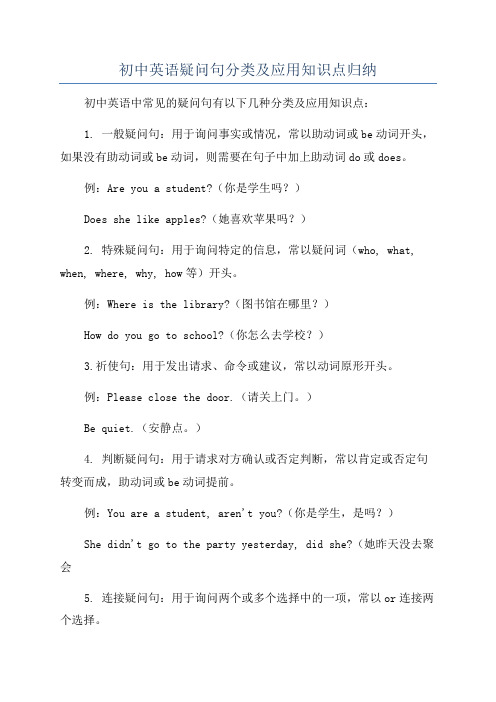
初中英语疑问句分类及应用知识点归纳初中英语中常见的疑问句有以下几种分类及应用知识点:
1. 一般疑问句:用于询问事实或情况,常以助动词或be动词开头,如果没有助动词或be动词,则需要在句子中加上助动词do或does。
例:Are you a student?(你是学生吗?)
Does she like apples?(她喜欢苹果吗?)
2. 特殊疑问句:用于询问特定的信息,常以疑问词(who, what, when, where, why, how等)开头。
例:Where is the library?(图书馆在哪里?)
How do you go to school?(你怎么去学校?)
3.祈使句:用于发出请求、命令或建议,常以动词原形开头。
例:Please close the door.(请关上门。
)
Be quiet.(安静点。
)
4. 判断疑问句:用于请求对方确认或否定判断,常以肯定或否定句转变而成,助动词或be动词提前。
例:You are a student, aren't you?(你是学生,是吗?)
She didn't go to the party yesterday, did she?(她昨天没去聚会
5. 连接疑问句:用于询问两个或多个选择中的一项,常以or连接两个选择。
例:Do you like apples or oranges?(你喜欢苹果还是橙子?)。
- 1、下载文档前请自行甄别文档内容的完整性,平台不提供额外的编辑、内容补充、找答案等附加服务。
- 2、"仅部分预览"的文档,不可在线预览部分如存在完整性等问题,可反馈申请退款(可完整预览的文档不适用该条件!)。
- 3、如文档侵犯您的权益,请联系客服反馈,我们会尽快为您处理(人工客服工作时间:9:00-18:30)。
一、选择题1.—________talk to someone when you feel sad?—I want to, but I don’t know how to talk with others.A.Why not B.Why don’t C.Why did you D.Why do you 2.—________ the population of your town?—About thirty thousand.A.What are B.How much is C.How many are D.What’s 3.—What color is the jacket?—________.A.It green B.It’s green C.It’s a green D.Is a green 4.—Is the boy your friend? —No, ________.A.it isn’t B.he isn’t C.she isn’t D.I am not 5.—________ do you play computer games, Lily?—I only play on Friday night.A.How B.Where C.Why D.When 6.—_________?—She is a shop assistant in the biggest mall.A.How old is your sisterB.What’s the matter with your sisterC.Where does your sister workD.What does your sister do?7.–________ would you like me to pay you?–Either Ali Pay or WeChat Pay. I don’t care.A.How B.What C.Why D.Who8.—I got into a fight with my best friends, what should I do?—________write him a letter?A.How about B.What about C.Why D.Why don't you 9.—Does your friend like hamburgers?—_______.A.Yes, he like B.No, he does C.Yes, he doesn't D.No, he doesn't 10.—Where__________ your friend __________from?—He comes from England.A.is; come B.do; come C.does; come D.are; be 11.---Is Alice writing? ---__________. She is listening to music.A.Yes, she isB.Yes, she doesC.No, she doesn’tD.No, she isn’t12.—_____ the population of the U.S.A.in 2005? —It _____ about 296 million.A.What is; is B.What was; was C.How many is; was D.How many was; is 13.—The surgeon hasn’t come back, has he?—_______, for he _______ Australia since last week and will be back in a week.A.No; has been in B.No; has gone to C.Yes; has gone to D.Yes; has been in 14.—Do you have an art festival at school?—Yes, ________.A.we have B.we can C.we do15.— _______ do you like Sunday?—Because I don’t need to go to school.A.When B.Why C.Where16.- ______ do you go to visit your grandparents?- Once a week.A.How far B.How much C.How often D.How long 17.The poor man needs our help, he?A.need B.needn't C.does D.doesn't 18.— ___________ do you wear?— Size XL.A.What color B.How much C.What size19.— Do you think the students need to have lunch at school?—________ It’s good for them to save time.A.Yes, I think so. B.No, I don’t think so.C.I agree with you. 20.—How much are these postcards?—________.A.There are two B.Not much C.Two pounds D.Very much 21.— ________ is the Shanghai Wild Animal Park?—It’s 15km east of the Bund.A.Who B.What C.When D.Where 22.—__________ will the project of Wuxi Metro Line 3 be completed?—It won’t take long. Just in about 3 months.A.How long B.How far C.How soon D.How often 23.— Look at my new watch.—Well, it’s so cool! When and where________you buy it?A.Do B.will C.did D.Are24.—_____ do you play computer games?—Twice a month.A.How long B.How manyC.How often D.How much25.— Why ______ you like the cat?—Because she’s kind of ______.A.do; boring B.don’t; interesting C.do; interested D.don’t; boring【参考答案】***试卷处理标记,请不要删除一、选择题1.A解析:A【解析】【分析】【详解】句意:——当你感到悲伤的时候,为什么不和别人说话呢?——我想,但我不知道怎么和别人说话。
考查特殊句型。
根据句意可知,此处表示“为何不”,有否定的含义,C和D没有否定含义,排除C和D。
B项中有助动词don’t,缺少主语,故排除B。
why not do sth表示“为什么不……”?属固定句型。
故选A。
2.D解析:D【解析】【分析】【详解】句意:——你的城市的人口有多少?——大约三万。
考查疑问词辨析及主谓一致。
What are是什么;How much is是多少;How many are是多少;What’s是什么。
首先询问人口有多少应用疑问词What或者How large,而不是How many, How much,故排除B和C;这句话的主语中心词是population,表示抽象意义的“人口”,动词用单数,故选D。
3.B解析:B【解析】【分析】【详解】句意:——这个夹克是什么颜色?——是绿色的。
考查特殊疑问句。
根据句意理解可知,问句问的是“什么颜色”,且主语是the jacket,是指物的名词,所以答句中应该用it指代,结构是“It is+颜色”,而颜色的词是形容词,前面不需要加冠词,故选B。
4.B解析:B【解析】【分析】句意:——这个男孩是你的朋友吗?——不,他不是。
考查否定回答。
it isn’t它不是;he isn’t他不是;she isn’t她不是;I am not我不是;根据句意理解可知,这里指是前句提到的那个男孩不是,指代男孩应该用he,故选B。
5.D解析:D【解析】【分析】【详解】句意:——莉莉,你什么时候玩电脑游戏?——我只在周五晚上玩。
考查疑问词,A. How怎样;B. Where哪里;C. Why为什么;D. When何时。
结合回答,应该是对时间的提问,故选D。
6.D解析:D【解析】【分析】【详解】句意:——你姐姐是做什么工作的?——她是一家最大商场的售货员。
考查疑问句。
A项是你姐姐多大了;B项是你姐姐怎么了;C项是你姐姐在哪里工作;答语是她是一家最大商场的售货员。
所以问题是问她的职业,故选D。
7.A解析:A【解析】【分析】【详解】句意:——您希望我怎样付款?——支付宝支付或微信支付都行。
我不在意。
A.How怎样;B. What什么;C. Why为什么;D. Who谁。
根据答语Either Ali Pay or WeChat Pay. 支付宝支付或微信支付都行。
可知,上文问的是支付方式,因此用how来提问。
故选A。
8.D解析:D【解析】【分析】【详解】句意:——我和我最好的朋友吵架了。
我应该做什么?——为什么不给他写一封信呢?考查特殊疑问词。
how about=what about,其后加动名词,表示“做某事怎么样?”;why为什么;why don’t you你为什么不,其后加动词原形。
由“write”为动词原形,故选D。
9.D【解析】【分析】【详解】句意:——你的朋友喜欢汉堡包吗?——不,他不喜欢。
考查一般疑问句。
分析题干,问句是does提问的一般疑问句,肯定回答用yes, he does.否定回答用No, he doesn't。
对照选项内容,D项符合其否定回答。
故选D。
10.C解析:C【解析】【分析】【详解】句意:——你的朋友来自哪里?——他来自英国。
考查动词,在英语中表示“来自”可用be from/come from。
观察句子,根据回答可在本句用的是come from,并且主语是第三人称单数“your friend你的朋友”,所以要借助助动词does 来变一般疑问句,并且谓语动词恢复原形,故选C。
